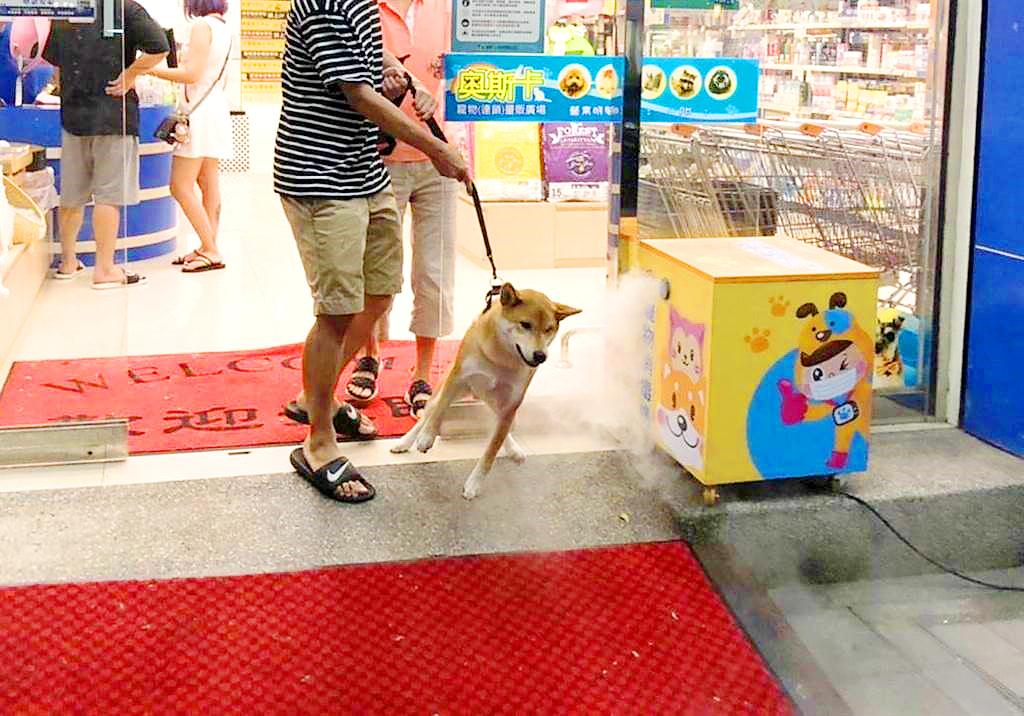Despite the easing of restrictions after the nationwide COVID-19 alert was lowered to level 2, the public should remain vigilant and ensure good indoor airflow to prevent another outbreak, a hospital director said on Sunday.
More variants would continue to emerge and vaccinated people might also become infected, but should not have serious symptoms, National Taiwan University Children’s Hospital superintendent Huang Li-min (黃立民) said.
“We must remain vigilant in the coming months. Anyone failing to follow disease prevention regulations or to stay in quarantine after testing posting for COVID-19 could cause a community outbreak,” he said.

Photo: CNA
It is imperative that people continue to wear masks and maintain social distancing, even after getting vaccinated, he said.
“It is best to avoid eating together with groups of people unless everyone in the group has been vaccinated,” he said.
As SARS-CoV-2 can spread through the air, maintaining good indoor airflow is imperative, National Taiwan University College of Public Health dean Chan Chang-chuan (詹長權) said.

Photo courtesy of the Hsinchu City Animal Protection and Health Inspection Office
“This is especially important in spaces where people eat. You should open windows even if you have the air-conditioner on,” he said. “When there is natural airflow, indoor air will be replaced by outdoor air in just 60 seconds.”
Surfaces including door handles, tables, windows, keyboards and cellphones should also be wiped clean regularly, with an alcohol solution if possible, he said.
“Since the government has decided not to wait for domestic cases to reach zero before lifting restrictions, there is still a chance that people could become infected in places where there are large gatherings,” Chan said.
Infectious disease specialist Lee Yuan-chang (李垣樟) said that a recent outbreak among factory workers in Chiayi County showed that the public must remain vigilant everywhere, including in places where there have never been community transmissions in the past.
In other news, the New Taipei City Animal Protection and Health Inspection Office has warned pet owners to ensure that their dogs do not come in contact with sanitizers sprayed throughout parks and other public venues.
Such sanitizers contain diluted bleach and sodium hypochlorite, which might cause an allergic reaction in some dogs, it said.
People whose dogs cough or develop swelling on their skin after being outside should wash their fur after returning home, it said.
Sanitizers should also never be applied directly to a dog’s body, it said, adding that veterinary clinics have animal-safe sanitizers that can be used if requested.
“Since dogs do not wear shoes or clothing they are exposed to residue from sanitizers left on the ground outside,” veterinarian Lin Tzu-yun (林子筠) said. “Pet owners should wipe their dog’s feet and fur with a clean, dry towel after returning home, and bathe them at regular intervals.”
Additional reporting by Wu Liang-yi and Chiu Shu-yu

Eight restaurants in Taiwan yesterday secured a one-star rating from the Michelin Guide Taiwan for the first time, while three one-star restaurants from last year’s edition were promoted to two stars. Forty-three restaurants were awarded one star this year, including 34 in Taipei, five in Taichung and four in Kaohsiung. Hosu (好嶼), Chuan Ya (川雅), Sushi Kajin (鮨嘉仁), aMaze (心宴), La Vie by Thomas Buhner, Yuan Yi (元一) and Frassi in Taipei and Front House (方蒔) in Kaohsiung received a one-star rating for the first time. Hosu is known for innovative Taiwanese dishes, while Chuan Ya serves Sichuan cuisine and aMaze specializes

STATS: Taiwan’s average life expectancy of 80.77 years was lower than that of Japan, Singapore and South Korea, but higher than in China, Malaysia and Indonesia Taiwan’s average life expectancy last year increased to 80.77 years, but was still not back to its pre-COVID-19 pandemic peak of 81.32 years in 2020, the Ministry of the Interior said yesterday. The average life expectancy last year increased the 0.54 years from 2023, the ministry said in a statement. For men and women, the average life expectancy last year was 77.42 years and 84.30 years respectively, up 0.48 years and 0.56 years from the previous year. Taiwan’s average life expectancy peaked at 81.32 years in 2020, as the nation was relatively unaffected by the pandemic that year. The metric

Taiwan High Speed Rail Corp. (THSRC) plans to ease strained capacity during peak hours by introducing new fare rules restricting passengers traveling without reserved seats in 2026, company Chairman Shih Che (史哲) said Wednesday. THSRC needs to tackle its capacity issue because there have been several occasions where passengers holding tickets with reserved seats did not make it onto their train in stations packed with individuals traveling without a reserved seat, Shih told reporters in a joint interview in Taipei. Non-reserved seats allow travelers maximum flexibility, but it has led to issues relating to quality of service and safety concerns, especially during

A magnitude 5.1 earthquake struck Chiayi County at 4:37pm today, the Central Weather Administration (CWA) said. The hypocenter was 36.3km southeast of Chiayi County Hall at a depth of 10.4km, CWA data showed. There were no immediate reports of damage resulting from the quake. The intensity of the quake, which gauges the actual effect of a seismic event, measured 4 in Chiayi County, Tainan and Kaohsiung on Taiwan's seven-tier intensity scale, the data showed. The quake had an intensity of 3 in Chiayi City and Yunlin County, while it was measured as 2 in Pingtung, Taitung, Hualien, Changhua, Nantou and Penghu counties, the data